Welcome to yet another insightful and informative article on our website. If this is your first time visiting our blog, we’re excited to have you on board. We’ve written several comprehensive and easy-to-understand articles that can help you navigate the world of web hosting, hosting reviews, and even hot web hosting deals. Some of our most popular posts include Top 10 Fastest Web Hosting Providers, How to Choose the Best Web Hosting for Your Website, The Best Managed WordPress Hosting Providers, Best SSD Web Hosting Providers, Best Budget-Friendly Hosting Providers, and How to Transfer Your Website to a New Hosting Provider.
In this article, we’ll be discussing what Cloud Hosting is, the Best cloud hosting Providers, and Benefits to consider in 2025. Whether you’re a business owner, developer, or blogger, this guide will help you understand why cloud hosting is a great option for you.
Let’s get started.
What is Cloud Hosting?
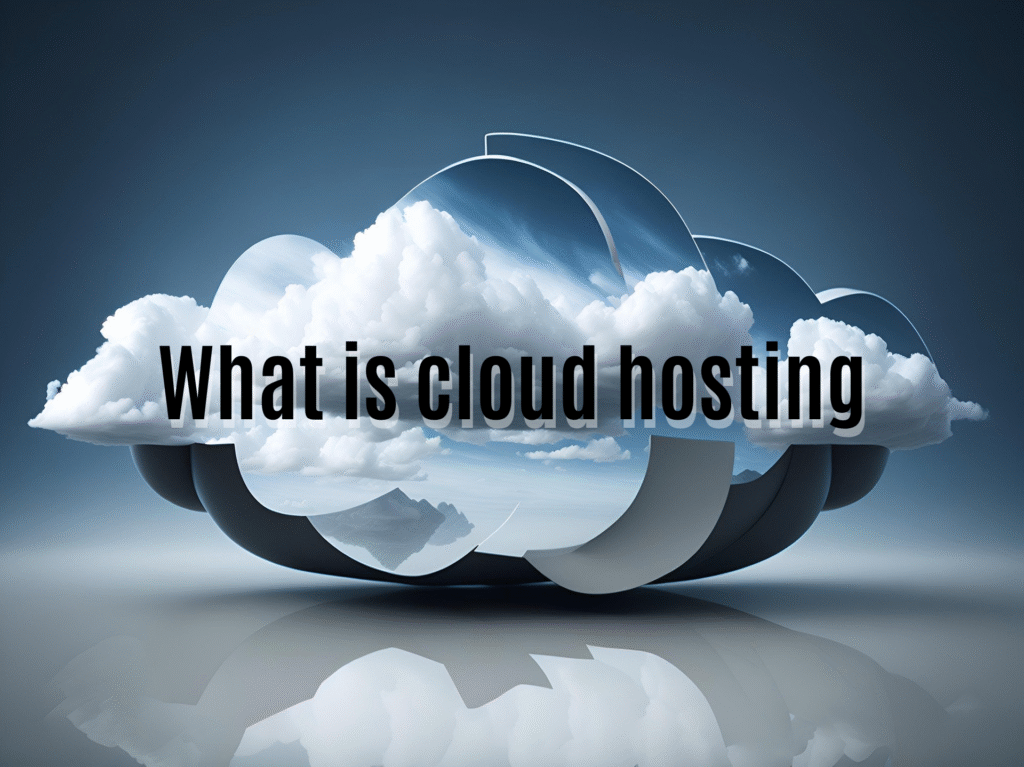
Before we talk about the best cloud hosting, let’s first know what cloud hosting is. Cloud hosting is a modern way of storing and running websites, apps, and digital services. Instead of relying on one single physical server (like the old days of web hosting), cloud hosting uses a whole network of servers that work together — what we call “the cloud.” This setup offers powerful flexibility, speed, and high-level reliability.
So here’s how it works in real-world terms: Imagine your website is like a shop. With traditional hosting, that shop sits in one building. If something happens to that building — let’s say the power goes out or the server crashes — your shop shuts down. But with cloud hosting, your shop has branches spread across different buildings. If one branch has a problem, another one immediately takes over. That means your website stays online, loads fast, and can handle many visitors at once without crashing. It’s smart, safe, and built to scale.
And here’s the best part — you only pay for what you use. If your traffic goes up, the cloud gives you more power. If things slow down, you’re not stuck paying for resources you don’t need. It’s perfect for growing businesses, especially if you sell digital products or run an online platform that needs to be up 24/7.
The Journey of Cloud Hosting
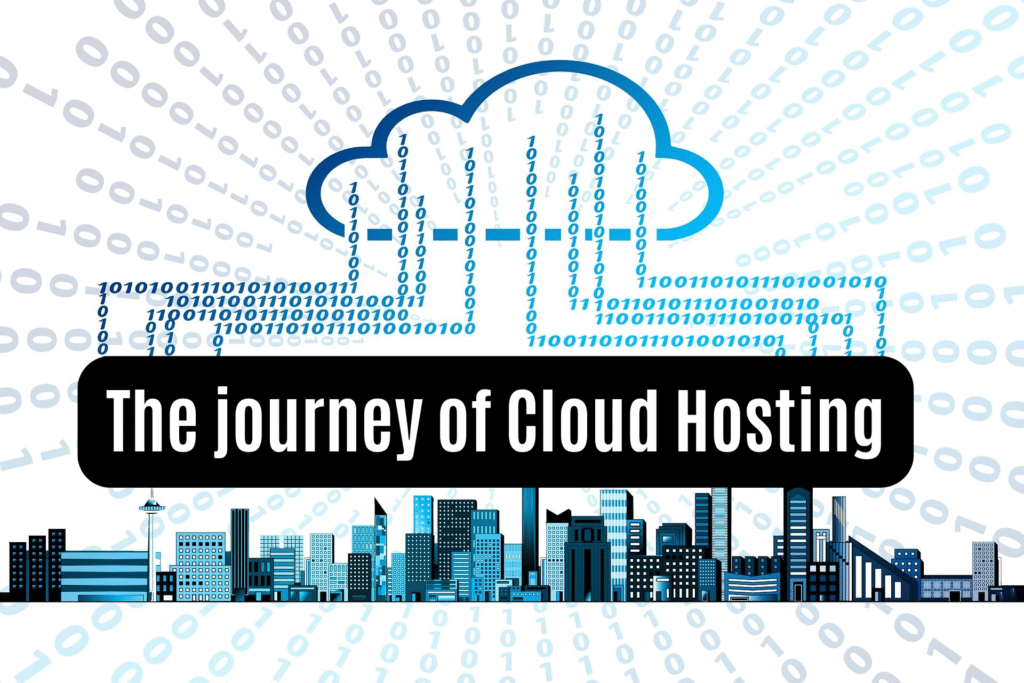
The idea behind cloud hosting has been around for much longer than most people realize. Way back in the 1960s, a computer scientist named John McCarthy predicted that computing would one day be delivered as a public utility, just like electricity or water. Of course, back then, the internet didn’t exist yet, and computers filled entire rooms.
Fast-forward to the late 1990s and early 2000s, when things started getting interesting. The internet became faster, more stable, and more accessible. Around that time, companies began experimenting with offering software and services online — Salesforce was one of the first to do this successfully in 1999. This concept later evolved into what we now know as cloud computing.
Then, in 2006, Amazon launched something that changed everything: Amazon Web Services (AWS). It offered tools like Elastic Compute Cloud (EC2) and Simple Storage Service (S3), which allowed people to rent virtual servers and storage space. That was a big deal. No longer did you need to own or maintain your servers — you could “rent” computing power as needed. This was the birth of cloud hosting as we know it today.
Not long after, other tech giants like Google and Microsoft jumped in with their platforms: Google Cloud and Microsoft Azure. This kicked off a new era of hosting, where developers, startups, and even government agencies began moving their websites and apps to the cloud.
Throughout the 2010s, cloud hosting went from an optional luxury to a must-have. Platforms like Netflix, Instagram, and even NASA began relying on it. Developers embraced newer technologies like containers and Kubernetes, which made cloud-based deployment even faster and more efficient.
Then came 2020 — and with it, the global COVID-19 pandemic. Businesses that were previously offline had to shift online almost overnight, and cloud hosting became their lifeline. Remote work, e-commerce, online learning — all of it exploded. Cloud hosting was the invisible engine running in the background, keeping websites and platforms live, fast, and secure.
Today, cloud hosting isn’t just a trend — it’s the standard. Whether you’re a small business owner selling eBooks or PLR products or you’re running a global enterprise, cloud hosting gives you the foundation to grow and adapt without worrying about servers, crashes, or traffic spikes.
Benefits of Cloud Hosting
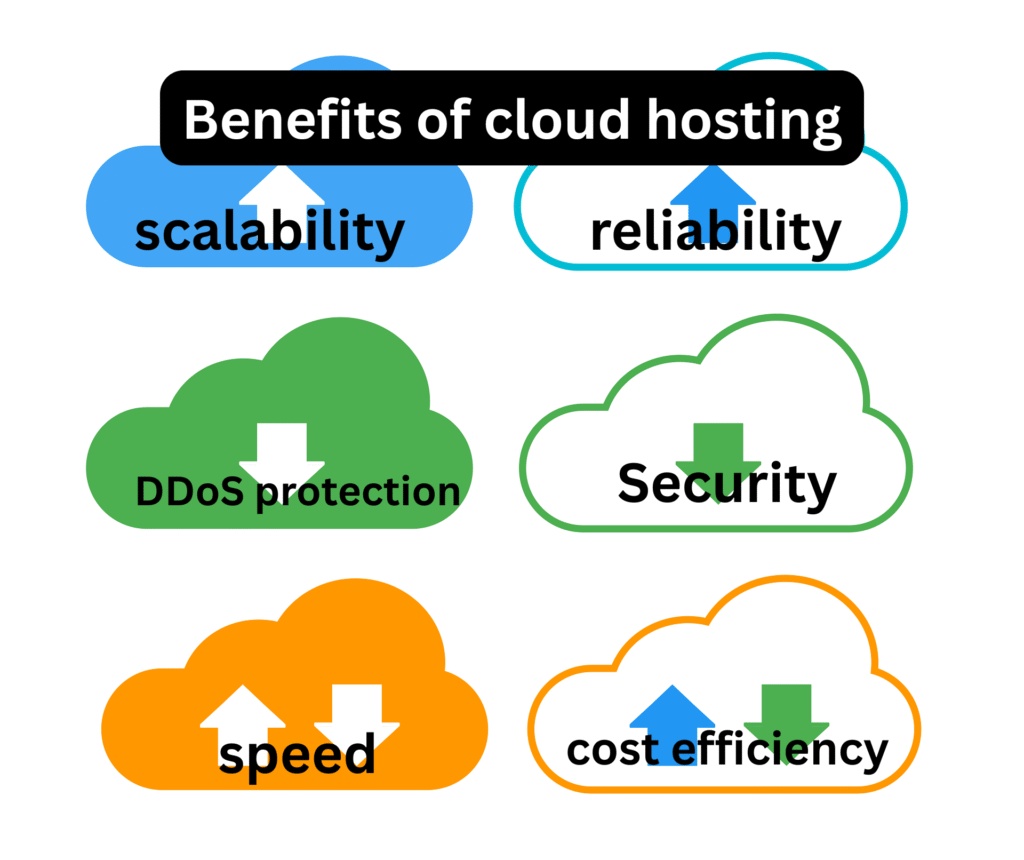
The best cloud hosting offers the perfect blend of power, reliability, and freedom. It gives digital entrepreneurs—from bloggers and freelancers to businesses selling PLR products—the room to grow without being boxed in by outdated limitations. Whether you’re just starting or scaling fast, cloud hosting keeps you agile, competitive, and always online
#1. First off, one of the biggest draws of cloud hosting is scalability. Imagine you’re running an online store or selling digital products—maybe you have a big promo coming up, or a blog post that goes viral. With traditional hosting, sudden spikes in traffic could crash your site or slow it down badly. But with cloud hosting, your server resources—like bandwidth, storage, and CPU power—can automatically expand to handle the demand. It’s like having a system that grows with you instead of limiting you. You only use (and pay for) what you need, and that’s a game-changer for any business aiming for growth.
#2. Then there’s reliability. In traditional hosting, if the physical server your site is hosted on fails, your site goes down. With cloud hosting, your data is stored across multiple servers in a network. So if one server fails, another instantly picks up the slack. It’s kind of like having backup dancers always ready to jump in if the main act stumbles. This setup dramatically reduces the risk of downtime, which means your website stays live and accessible when it matters most.
#3. Now let’s talk about performance and speed. Cloud hosting typically uses SSD (solid-state drive) storage, which is way faster than traditional hard drives. Combine that with global data centers and load balancing features, and your website visitors get faster load times no matter where they are. This isn’t just about user experience—speed directly affects your sales, conversions, and even search engine rankings. A slow site can cost you customers, but a fast one makes them stay longer and trust you more.
#4. Another huge benefit is cost efficiency. You don’t need to spend a fortune upfront for high-capacity servers you’re not even using yet. With cloud hosting, the pricing is usually flexible or “pay-as-you-go.” This means small startups and solo creators can start small and scale up when revenue grows. You avoid paying for unused resources, which is perfect if you’re bootstrapping or watching your budget closely.
#5. Security is also a strong point in cloud hosting. Reputable providers offer advanced features like end-to-end encryption, automatic backups, firewalls, and #6. DDoS protection. Since your data is spread across multiple servers and locations, it’s also harder for hackers or disasters to bring your whole system down. Some providers even include automatic updates and patching, which help seal vulnerabilities before they become a problem. So even if you’re not a tech expert, you’re still protected.
#7. Lastly, there’s accessibility and flexibility. With cloud hosting, you can access your hosting dashboard and files from anywhere—whether you’re working from home, a coffee shop, or while traveling. You’re not tied to a single physical server or location. Developers especially love this because they can deploy applications from any part of the world and manage cloud infrastructure remotely.
The Best Cloud Hosting Providers
Cloud hosting is generally more efficient, flexible, and cost-effective, while traditional hosting might be more suitable for specific use cases where full control over the infrastructure is required. Below are the top-performing and best cloud hosting providers.
#1. Amazon Web Services (AWS)
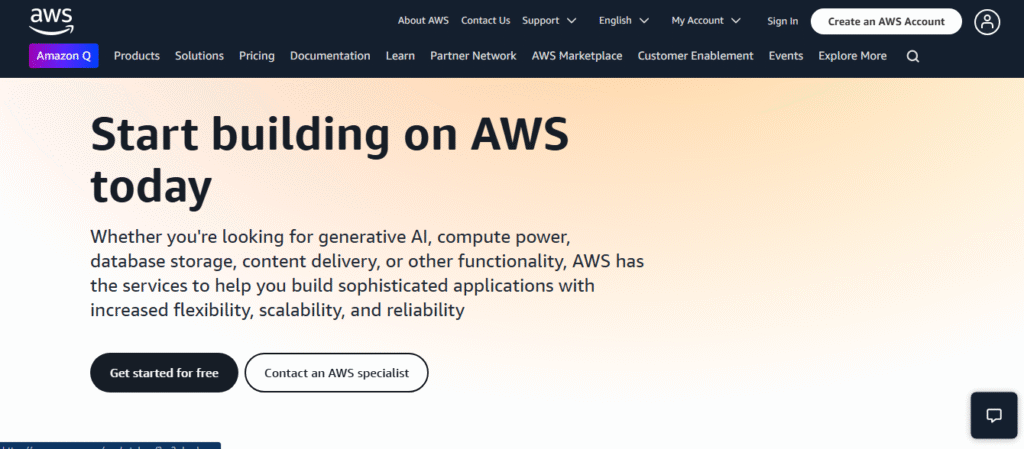
Amazon Web Services, commonly known as AWS, is a powerhouse in the cloud computing industry. Renowned for its vast array of services, AWS offers everything from virtual servers and storage solutions to advanced machine learning tools and serverless computing options. Its global infrastructure ensures high availability and scalability, making it a go-to choice for businesses of all sizes.
Performance-wise, AWS boasts a robust and reliable platform. Its services are designed to handle varying workloads efficiently, ensuring that applications run smoothly even under heavy traffic. The flexibility to scale resources up or down based on demand is a significant advantage, providing both cost-effectiveness and performance optimization.
When it comes to pricing, AWS operates on a pay-as-you-go model. This means you only pay for the services you use, without any long-term commitments. For instance, their Elastic Compute Cloud (EC2) allows you to rent virtual servers by the hour or second, depending on the instance type. Additionally, AWS offers a free tier with limited usage, perfect for testing and small-scale applications.
#2. Google Cloud Platform (GCP)
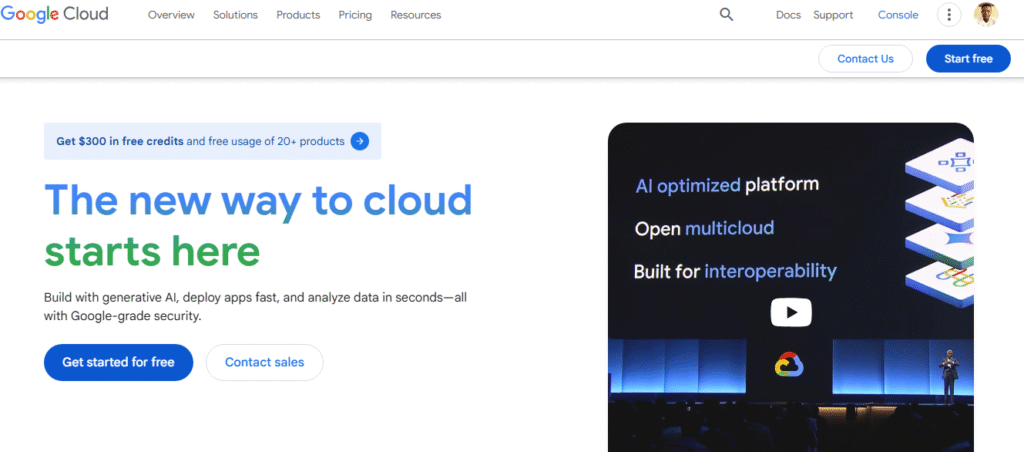
Google Cloud Platform, or GCP, is Google’s suite of cloud computing services. It provides a range of tools for computing, storage, machine learning, and data analytics. GCP is particularly favored for its data processing capabilities and integration with other Google services.
In terms of performance, GCP is known for its high-speed network and efficient data handling. Its infrastructure is designed to deliver low-latency and high-throughput, ensuring that applications perform optimally. GCP’s commitment to innovation means users benefit from cutting-edge technologies and continuous improvements.
GCP’s pricing is also based on a pay-as-you-go model. Users are billed for the resources they consume, with no upfront costs or termination fees. New customers receive $300 in free credits to explore and test GCP services. Additionally, GCP offers sustained use discounts and committed use contracts for long-term savings.
#3. Microsoft Azure

Microsoft Azure is a comprehensive cloud platform offering a wide range of services, including virtual machines, databases, AI tools, and DevOps solutions. Its seamless integration with Microsoft products like Windows Server, Active Directory, and SQL Server makes it an attractive option for businesses already entrenched in the Microsoft ecosystem.
Azure’s performance is marked by its global network of data centers, ensuring high availability and redundancy. The platform supports a variety of operating systems, programming languages, and frameworks, providing flexibility for developers and IT professionals.
Pricing on Azure is consumption-based, meaning you pay for what you use. Azure also offers a free tier with access to popular services for 12 months and over 25 services that are always free. For those with predictable workloads, Azure provides options like reserved instances and savings plans to reduce costs.
#4. DigitalOcean

DigitalOcean is known for its simplicity and developer-friendly approach. It offers cloud computing solutions that are easy to deploy and manage, making it ideal for startups, small businesses, and individual developers.
Performance-wise, DigitalOcean provides reliable and fast virtual machines, known as Droplets. These are optimized for various workloads, including web applications, databases, and development environments. The platform also offers scalable storage solutions and networking features.
DigitalOcean’s pricing is straightforward and transparent. Droplets start at $4 per month, and users can choose from a variety of plans based on their resource needs. The platform also offers a free tier for static sites and a modular pricing structure for its App Platform, allowing users to pay only for the components they need.
#5. Cloudflare

Cloudflare’s pricing is very generous, especially if you’re just starting. They offer a completely free tier that includes essential CDN and security services, and it’s often enough for small to medium-sized sites. Paid plans start at $20 per month and scale based on your needs, especially if you want advanced firewall rules, analytics, or business-grade support.
Each of these providers has its strengths and ideal use cases. If you’re just launching your PLR business and want simplicity and predictable pricing, DigitalOcean might be the best fit. If you want scalability and access to a wide range of tools, AWS or Azure could be your go-to. For speed and data-heavy apps, GCP is worth considering. And if you want added protection and speed, Cloudflare can be layered on top of any of them
#6. Hostinger

Starting with Hostinger, this platform is highly regarded for offering fully managed cloud hosting that’s both affordable and user-friendly. It’s perfect for people who don’t want to deal with the complexities of server maintenance. Hostinger takes care of all the technical heavy lifting, from server setup to updates and security, so you can focus on your website or business. The performance is impressive for the price—fast load times, 99.9% uptime, and global data centers that ensure your site is accessible from anywhere. Hostinger’s cloud hosting plans typically start around $9.99/month when billed annually, and they often include a free domain and SSL certificate.
#7. Liquid Web
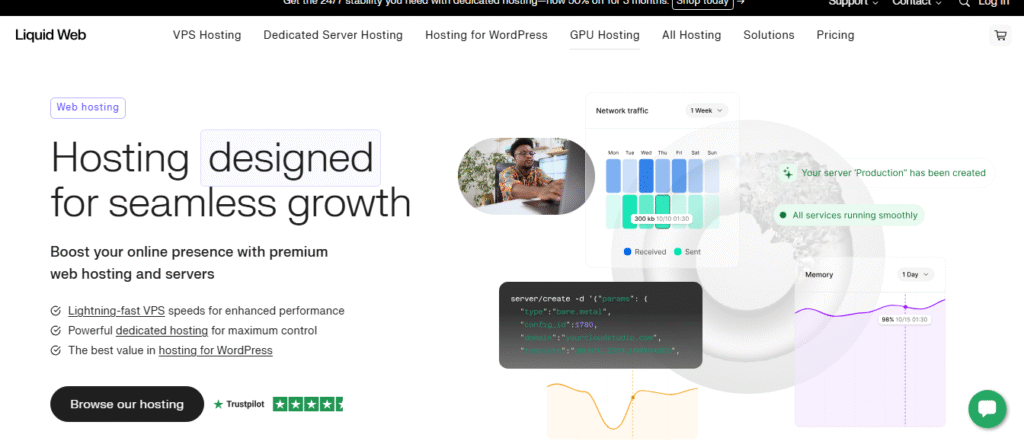
Liquid Web is ideal if you run a business and need rock-solid, high-performance cloud hosting. It’s not the cheapest option out there, but you’re paying for premium service, including fully managed support, enterprise-grade infrastructure, and expert-level customer care. Liquid Web is a favorite among agencies, e-commerce stores, and developers who need reliability above all. It excels in uptime, speed, and scalability. Pricing starts at about $59/month, so it’s best suited for businesses that need serious power behind their digital operations.
#8. InMotion Hosting

When it comes to InMotion Hosting, it offers easily scalable cloud hosting solutions that are great for growing websites. What makes them stand out is their balance between performance and customization. You can scale resources like RAM and storage on demand, making it suitable for both small and medium-sized businesses that expect traffic fluctuations. Their cloud VPS plans typically start at $5/month and go up based on how much CPU and RAM you need. You also get features like root access, SSD storage, and optional server management support.
#9. InterServer
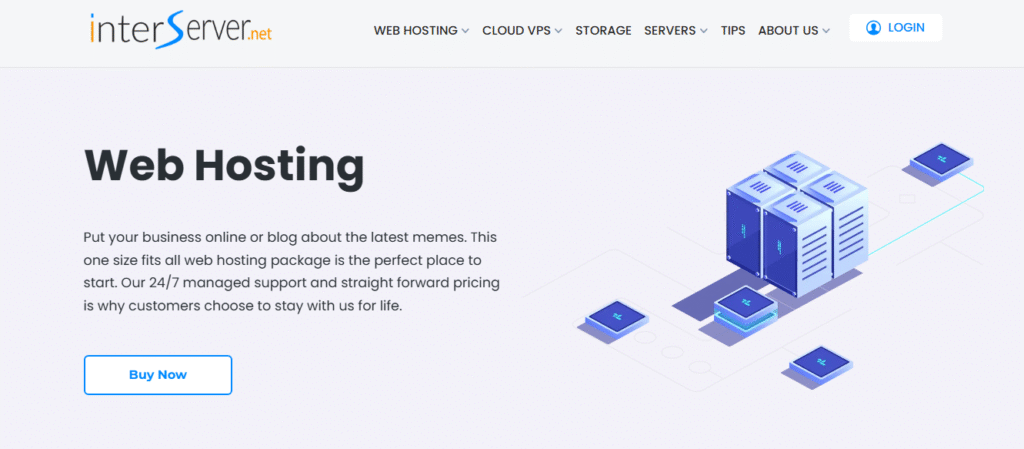
InterServer is known for being incredibly versatile. It’s a no-fuss, straightforward hosting solution that gives you access to a wide range of tools and operating systems for your cloud setup. Whether you’re a beginner launching a blog or a developer deploying a custom app, InterServer gives you the flexibility to choose what works best for your needs. Performance is solid, with decent uptime and SSD-powered speed. Pricing is very competitive, often starting around $6/month, and the company is known for its “price lock guarantee,” meaning your rates won’t randomly increase.
#10. Kamatera

If you’re looking for deep customization, Kamatera is probably the most flexible cloud hosting provider you’ll come across. It allows you to build your cloud server from scratch, selecting how much RAM, CPU, storage, and bandwidth you want. It’s an excellent choice for developers or businesses with specific hosting requirements. Kamatera runs on a global network of data centers and boasts near-zero latency and real-time scaling. Their pricing is also usage-based, starting as low as $4/month, and you can try it free for 30 days, which is perfect for testing the waters.
#11. DreamHost

DreamHost takes a simpler, more beginner-friendly approach to cloud hosting. It’s known for making things easy, which is great if you’re just getting into cloud hosting or running a smaller project. While it doesn’t offer as many advanced features as some of the others, it delivers reliable performance, SSD storage, and excellent customer support. DreamHost offers transparent, pay-as-you-go pricing starting at around $4.50/month, and there are no hidden fees. Their dashboard is clean and easy to navigate, making it a stress-free experience for users.
#12. Bluehost

Bluehost is a big name in the WordPress world, and its cloud hosting options are particularly well-tailored for WordPress users. If your site is built on WordPress and you want fast, secure, and scalable hosting, Bluehost delivers. It offers automatic updates, built-in caching, and resource monitoring to ensure optimal site performance. While not as customizable as Kamatera or as enterprise-focused as Liquid Web, Bluehost provides a great balance for freelancers, bloggers, and small businesses. Their pricing usually starts at around $10/month for cloud plans and comes with 24/7 support and a free domain for the first year.
#13. IONOS by 1&1

IONOS by 1&1 is one of the most affordable cloud hosting providers on this list, yet it still offers a powerful set of features. It’s particularly good for small businesses and developers who want professional-level infrastructure without breaking the bank. Performance-wise, it offers decent speed and uptime, although not always on par with premium providers. IONOS plans often start at just $2/month, making it an extremely budget-friendly option with features like scalable resources, dedicated IPs, and built-in security.
#14. ScalaHosting
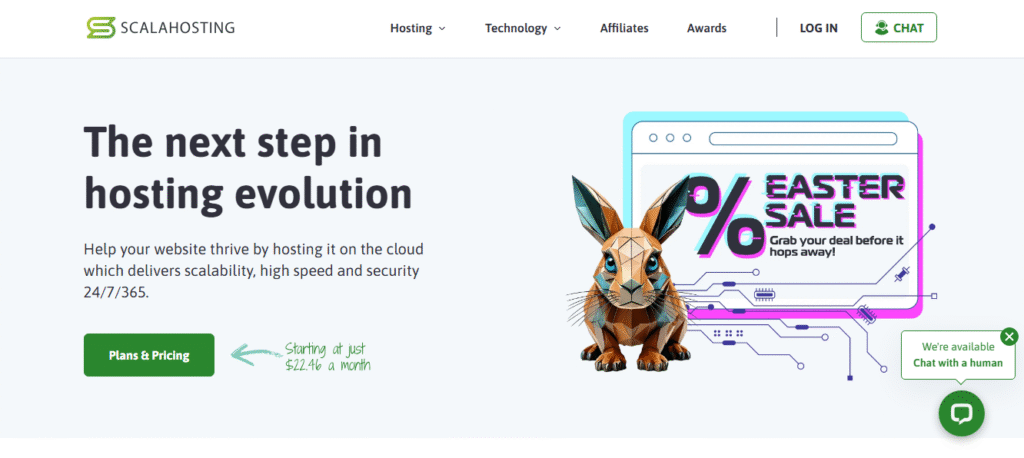
For small businesses, ScalaHosting is a hidden gem. It combines the flexibility of cloud VPS with user-friendly features and a strong focus on security. What sets ScalaHosting apart is its proprietary SPanel, a powerful alternative to cPanel that makes managing your cloud server a breeze. Performance is excellent, with lightning-fast SSD storage and free daily backups. Prices for cloud VPS typically start at around $14.95/month, which includes fully managed support, free migrations, and top-tier security tools.
#15. A2 Hosting

Finally, there’s A2 Hosting, which is all about speed. If performance is your top priority, especially in terms of page load times, A2 Hosting is worth considering. Their cloud hosting plans are optimized with turbo servers and NVMe SSDs, which make websites run noticeably faster. A2 also offers developer-friendly features like root access and custom configurations. Their pricing starts at around $5/month for unmanaged plans, while managed cloud hosting starts higher, around $30/month, depending on the resources you need.
Conclusion: Cloud Hosting, Its Benefits, and the Best Cloud Hosting Providers
Each of these providers brings something unique to the table. Whether you’re looking for affordability, customization, managed services, or raw speed, there’s a cloud hosting option here that fits your business needs. If you’re not sure which one is best for your project or budget, I can help you narrow it down—just let me know what kind of digital product or website you’re planning to host.
Cloud Hosting vs. Traditional Hosting
| Feature | Cloud Hosting | Traditional Hosting |
| Scalability | Instantly scalable—resources increase or decrease based on demand | Limited scalability—manual hardware upgrades needed to expand resources |
| Cost | Downtime risk is higher due to a single point of failure | Fixed pricing—pay for a set package regardless of usage |
| Performance | High-speed performance using distributed cloud servers with load balancing | Performance depends on one physical server; speed may vary |
| Security | Advanced built-in security, encryption, and automatic updates | Security requires manual setup and regular monitoring |
| Reliability | Very reliable—uses multiple redundant servers to avoid downtime | The user is responsible for server maintenance, backups, and issue resolution |
| Maintenance | Fully managed—provider handles updates, patches, and system health | User is responsible for server maintenance, backups, and issue resolution |
| Access | Global accessibility—manage your hosting from anywhere with an internet connection | Access tied to physical server location—less flexibility |
| Customization | Highly flexible—easily customize server environment and resources | Limited by fixed server specs and configurations |
The best Cloud hosting is generally more efficient, flexible, and cost-effective, while traditional hosting might be more suitable for specific use cases where full control over the infrastructure is required.
Cloud hosting is like the evolution of traditional web hosting, built for today’s fast-paced, digital-first world. It’s flexible, reliable, and smart — and it continues to evolve with the help of major tech players like Amazon, Google, Microsoft, and others. What started as a futuristic idea has now become the backbone of the internet.
Check out some of our most popular posts: Top 10 Fastest Web Hosting Providers, How to Choose the Best Web Hosting for Your Website, The Best Managed WordPress Hosting Providers, Best SSD Web Hosting Providers, Best Budget-Friendly Hosting Providers, and How to Transfer Your Website to a New Hosting Provider
Whether you’re just starting your digital business or already scaling it, understanding how the cloud hosting works — and how far it has come — helps you make smarter, more informed decisions for your online presence.

